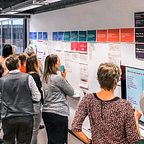Weeknotes 4: Synthesising East London findings and prep for Somerset
26 April 2019, written by Emma Diamond, User Researcher, FutureGov
What we’ve done in the last two weeks
The past few weeks have been all about finishing in East London, starting to pull together our findings, and set up for locations two(south / west Somerset) and three (South Yorkshire and Bassetlaw)!
NEAS
The week before Easter a few of us (Claire, Josefeen, and Emma) visited the North East Ambulance Service up in Newcastle. NEAS is a digital exemplar we included in our engagement plan to understand the highlights and barriers of digital to making change happen from a provider perspective. We had the most interesting time, speaking to strategic and clinical leads there, as well as doing some 111 and 999 call listening. The NEAS team gave us a comprehensive overview of their complex service and identified fragmented, non-interoperable care records as one of the biggest challenges facing their service.
A quote from one of the leaders we interviewed nicely illustrates the challenge:
“If we had fully integrated care records, after they (the patient) have called and we suggest they go to A&E, if they walk into any ED, the staff can see an unopened event on their record and read it (and therefore have all the info from our triage). That is the biggest challenge, until we can do that, we can’t account for / empower people’s choices.”
Analysis and synthesis
This week (post-Easter!), we’ve focused on analysing and synthesising findings from East London. We rapidly covered the walls and windows with the vast findings from our engagement work. We’d a lot to achieve in a relatively short space of time — trying to synthesise all our learnings from nearly 60 conversations with patients and staff (from leaders and commissioners to frontline clinical and non-clinical) across several UEC services in East London. We did thematic analysis for each line of enquiry, breaking up into teams each focusing on a cohort, and following a set of ‘ground rules’ to keep us on-task, person-centred and focused.
To prepare for the day, we immersed ourselves in the write-ups of the cohorts (patient or staff groups) we were representing. On the day, we each advocated for our specific user group and answered the lines of enquiry in their voice using quotes, observations and findings gathered from conversations.
After spending most of the day identifying themes and early insights against our lines of enquiry, we were able to spend the afternoon refining early opportunity areas and ‘How Might We’ design provocations. The success of this synthesis session means we’re now in a position to start putting together the ‘scaffold’ of the as-is experience journey from the patient perspective and the staff perspective, as well as socialise emergent opportunities with stakeholders to kick-start the prioritisation process.
Synthesising iteratively like this following engagement in each location and ensures we won’t lose any learnings as we collect more data in locations two and three. This enables us to begin constructing hypotheses and assumptions we can test along the way, as well as identify gaps in our knowledge that we’ll need to focus on in consecutive locations.
What we’re doing this week
This week we’re kicking off fieldwork in South and West Somerset! The screenshot below shows the area we’re focussing on for this location — rural and remote! The idea is to understand the experiences of patients accessing and receiving care in UEC settings in more remote locations, to contrast with the densely populated and well-serviced (in terms of quantity of UEC services) East London. We’re looking forward to learning more!
Our first port of call will be Bridgwater UTC, with Emily and Claire on Monday and Tuesday, driving through some lovely countryside. We’re also working to access some GP practices in the Exmoor area to speak to staff and patients where possible. We’re also planning a visit to Yeovil ED in the next two weeks.
In parallel, we’re recruiting for our reflective interviews — aiming to conduct in-depth, ethnography style interviews with eight patients representing diverse patient groups. This is proving to be more of a challenge than in East London due to the remoteness (ironically the very reason we want to go there!), but we have multiple methods of recruitment and will prevail, I’m sure.
While all that is going on, those team members not in the field will be continually refining our learnings from the synthesis session. We’ll be building the scaffold of our as-is journey and ecosystem maps from multiple staff and patient perspectives.
We would also like to start sharing some of the emergent opportunities to get everyone’s thoughts at the Show & Tell, the DUEC conference on 14 May and various other events over May and June.
Get in touch with Sophie Dennis or Joanna Choukeir if you’d like to chat through any of the work.
